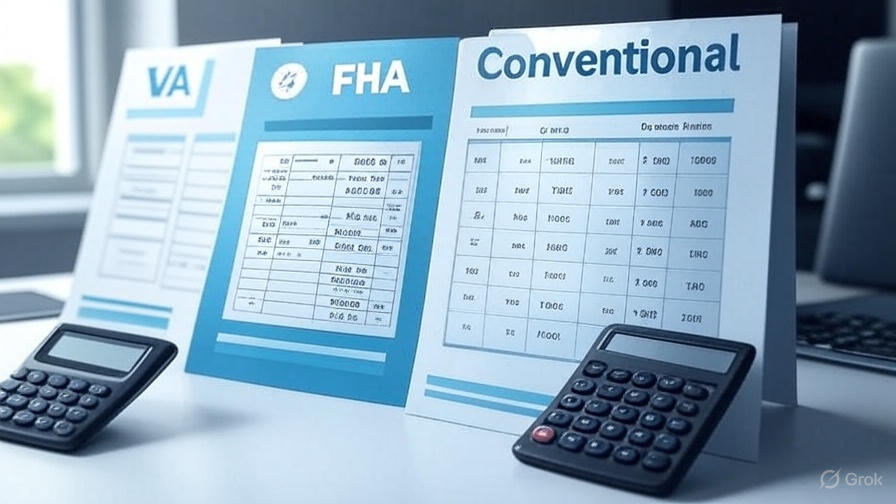Using a VA loan in North Carolina? The appraisal checks fair value and basic livability so you can close with confidence. Here’s what to expect, how Tidewater and ROV work, and the simple prep that keeps your closing on track.
VA appraisal basics
The VA appraisal confirms market value and checks Minimum Property Requirements (MPRs)—basic health and safety items. It’s different from a home inspection, which is a deeper look at condition and maintenance.
New to VA loans? For a bigger picture on eligibility and benefits, see our VA loans in North Carolina guide. If you like source docs, you can also see the VA Lender’s Handbook.
How the process flows
Most NC VA buyers will see this sequence:
- Order: After you’re under contract, your lender orders a VA appraisal. A VA-approved appraiser accepts the case and schedules access with the listing agent.
- Valuation work: The appraiser reviews comparable sales and notes obvious condition items.
- Tidewater (if invoked): If the appraiser believes support for the contract price may be thin, they can open a short “Tidewater” window. You won’t submit comps directly—your lender and agent coordinate and deliver the market data.
- Report issued: You receive a Notice of Value (NOV) with the appraised value and any MPR items.
- ROV (if needed): If value still seems off, your lender can pursue a Reconsideration of Value with concise, stronger support.
- Repairs or waiver review: If MPRs are flagged, the seller often makes simple fixes. Waivers can be considered case-by-case when issues aren’t clear safety concerns.
MPR Waivers
The borrower is able to request MPR waivers with the VA. Typically they grant non-critical health and safety issues, but never guaranteed.
Timing and fees
VA sets both the maximum appraisal fee and the expected turnaround time from assignment to delivery. That guidance is published and updated by VA; see the VA appraiser fee schedule for details by state and property type.
Conventional appraisals don’t follow VA’s schedule—the lender or AMC (appraisal management company) governs fees and timelines, which can vary by market conditions. Either way, fast access and utilities-on help the clock.
Timeline map → Pre-approval → Contract → Appraisal ordered → (Tidewater window, if used) → NOV issued → Repairs/waiver review → Clear-to-close. Common snag: delayed access; fix: confirm showing instructions and utilities early.
Tidewater, ROV, and MPRs
Tidewater vs. other loan types
Tidewater is a VA feature that invites market data before the value is finalized when support looks thin. Your lender and agent—not you directly—compile and submit the comps during the short window. Conventional and FHA appraisals typically handle any value rebuttal after the report is issued.
Reconsideration of value (ROV)
If the final value still seems low, your lender can request an ROV with stronger comparables, corrected property data, or clear market updates. Keep the narrative tight and fact-based for best results.
MPR items and waiver notes
MPRs cover fundamentals—safe electric and water, heat, roof without active leaks, safe access/egress, and no obvious hazards. Straightforward fixes are common. Waivers may be considered in limited situations where the item isn’t a clear safety concern. For repair credits, promises, or waiver assumptions in your contract, coordinate language with your lender first so expectations match VA and investor rules.
| 🟦 VA | ⬜ Conventional | |
| Pre-value collaboration | Tidewater window invites comps via lender/agent | No formal pre-value step; rebuttal after report |
| Value challenge | ROV through lender with concise support | Lender/AMC rebuttal; process varies by lender |
| MPR/condition | Checks basic livability/safety standards | Condition noted; lender/underwriter overlays vary |
| Fees | Set by VA (see schedule) | Set by lender/AMC; market-dependent |
| Timeline | Set by VA from assignment to delivery | Set by lender/AMC; varies by volume and access |
Color chips mark columns only; no extra styling needed for readability. Fees/timelines are governed by VA for VA loans; conventional follows lender/AMC policy.
Common pitfalls and tradeoffs
- Slow access = slow file: Confirm lockbox, alarm codes, pets, and utilities so the appraiser can enter once and finish.
- Unfocused comps: In Tidewater or ROV, lead with three comps: closest, most recent, most similar. Clarity beats volume.
- Vague repair language: If MPRs pop up, align any repair credits or promises with your lender before you commit in writing.
Raleigh, Durham, and Charlotte notes
Triangle and Charlotte submarkets can move quickly. Recent closed sales may post while your appraisal is in process; your lender and agent will monitor and use any new, relevant comps if Tidewater or an ROV is appropriate. Your job: keep access smooth and documents prompt.
VA Appraisal FAQs
No. The appraisal sets market value and checks basic MPR items. A home inspection is optional but recommended to deeply evaluate systems and maintenance needs.
Your lender and your agent coordinate the comps and submit them during the Tidewater window. You won’t send data directly to the appraiser.
Your lender submits it with succinct support—better comps, corrected data, or a clear market update. Keep it factual and organized for the best shot.
Functional heat, safe electric and water, roof without active leaks, safe access/egress, and no obvious hazards. Most fixes are straightforward once identified.
VA publishes the maximum fee and expected delivery timeline by state and property type from assignment to report. See the VA appraiser fee schedule for current details.
Want a plan that matches your timeline?
I’ll work up loan options that fit your goals, needs, and qualifications—so you’re never squeezed into the wrong program. Clear paths. Real numbers. Calm decisions.
Prefer to talk? 984-289-6479 · wolff@michaelthebroker.com



